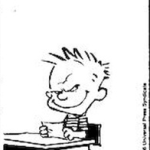 “The road to hell is paved with works-in-progress.”
“The road to hell is paved with works-in-progress.”
—Philip Roth
“The road to hell is paved with adverbs.”
—Stephen King
“Writing a book is a horrible, exhausting struggle, like a long bout of some painful illness. One would never undertake such a thing if one were not driven on by some demon whom one can neither resist nor understand.”
—George Orwell
“We are all apprentices in a craft where no one ever becomes a master.”
—Ernest Hemingway
“Every secret of a writer’s soul, every experience of his life, every quality of his mind, is written large in his works.”
—Virginia Woolf
“Write. Rewrite. When not writing or rewriting, read. I know of no shortcuts.”
—Larry L. King, WD
“When your story is ready for rewrite, cut it to the bone. Get rid of every ounce of excess fat. This is going to hurt; revising a story down to the bare essentials is always a little like murdering children, but it must be done.”
—Stephen King, WD
“Long patience and application saturated with your heart’s blood—you will either write or you will not—and the only way to find out whether you will or not is to try.”
—Jim Tully, WD
“Beware of advice—even this.”
—Carl Sandburg, WD
“I would advise anyone who aspires to a writing career that before developing his talent he would be wise to develop a thick hide.”
—Harper Lee, WD
“People say, ‘What advice do you have for people who want to be writers?’ I say, they don’t really need advice, they know they want to be writers, and they’re gonna do it. Those people who know that they really want to do this and are cut out for it, they know it.”
—R.L. Stine, WD
“Remember: Plot is no more than footprints left in the snow after your characters have run by on their way to incredible destinations.”
—Ray Bradbury, WD
“I think all writing is a disease. You can’t stop it.”
—William Carlos Williams
“The difference between the almost right word and the right word is … the difference between the lightning bug and the lightning.”
—Mark Twain
“I always start writing with a clean piece of paper and a dirty mind.”
—Patrick Dennis
“Do not hoard what seems good for a later place in the book, or for another book; give it, give it all, give it now.”
—Annie Dillard
“Write while the heat is in you. … The writer who postpones the recording of his thoughts uses an iron which has cooled to burn a hole with.”
—Henry David Thoreau
(Those were a few of the best writing quotes compiled by Writer’s Digest)
I would add my own to the list:
“Writing is a journey, just like life. Some of the best moments will be unexpected and fleeting. Don’t focus so much on the future that you forget to enjoy the present.”
Embarking on a career as a writer is a long-term commitment. It begins with long months and even years mostly spent alone as you hone your craft and develop your skills. Authors who break out as ‘instant successes’ usually take years to get there.
It’s not a sprint, it’s a marathon. Get used to the idea that you’ll be doing this a very long time. The price may be high, but it’s totally worth it when you see your vision on the page, when your words bring to life the images only you used to be able to see. It is magical, thrilling, and humbling.
To paraphrase an old proverb, A journey of a thousand pages begins with a single word.
Make it the best word you can.
Then write the next, and the next, and the next.
It’s a journey. Enjoy it.


